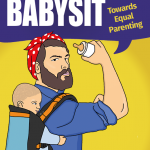On both occasions Mrs Adams was pregnant, there was one condition that I was very concerned about: Pre-eclampsia. It’s a condition caused when the placenta doesn’t function properly. I can’t quite explain why pre-eclampsia bothered me so much, but as it turned out my fears weren’t entirely misplaced because she was affected by a related condition.

Here’s what happened. A few days after Mrs Adams gave birth to Izzy, our second daughter, a midwife came to check on mum and baby. At the time I was out playing with our other child, Helen. Our time playing was cut short when I got a phone call from my mother in law telling me to get back home as quickly as I could.
The midwife had taken my wife’s blood pressure and it was astronomically high. There was a possibility she may have eclampsia, a related and equally serious condition.
Mrs Adams was immediately readmitted to hospital where she spent several days having tests. Eventually her blood pressure stabilised and she was discharged, but it was a very tense time and it was very sad that we weren’t able to be together as a family.
We were lucky. Each year, 76,000 people lose their lives because of pre-eclampsia. The charity Action on Pre-eclampsia (APEC) exists to support women with eclampsia, educate healthcare professionals about the condition and carry out research into it.
Marcus Green is the chief executive of the charity. He agreed to answer some questions about this condition and tell me more about the charity’s work.
Marcus, can you please introduce Action on Pre-eclampsia and your role for the organisation?
Action on Pre-eclampsia is the UK charity for women who are in any way affected by the illness as well as the related conditions of help syndrome and eclampsia itself. We provide a wide range of resources both for women who are concerned and for healthcare professionals as well as being involved in some cutting-edge research about what causes this condition, which at some point may lead to either cure or prevention.
I am the chief executive and I’ve been working for the charity for over three years. My role is to manage the tiny team of staff that we have raised the profile of the organisation and ensure that we are fit for purpose.
Why should people be concerned about pre-eclampsia?
Pre-eclampsia is a serious condition which strikes very quickly and can strike hard. Across the world 76,000 people die each year from the condition and thankfully in the United Kingdom, due to exceptional care and management less than one woman in a million will die of it but we are still losing a thousand babies each year. It is impossible to underestimate the devastation that this causes to those families.
Has your family been affected by eclampsia?
My wife was affected by pre-eclampsia during her pregnancy with our daughter who is now a thriving pre-teen.
What’s likely to happen if you are diagnosed with pre-eclampsia? Are you likely to have further testing, treatments and so on?
Pre-eclampsia can strike at any time during pregnancy after the twentieth week and so the treatment that a woman will receive will depend on the severity of the pre-eclampsia and the time that it strikes. We used to talk about mild and severe pre-eclampsia but more frequently we now speak of early and late pre-eclampsia. The important thing is that the care a woman receives is appropriate to her and her child.
We talk of a cure for pre-eclampsia being delivery of the baby and early in pregnancy that is not a viable option. It is at that stage that we would be looking for women to receive the very best care for them with the aim of keeping the baby in the woman for as long as possible. If a woman gets late onset pre-eclampsia, then it is often safer to deliver in a planned way. Doctors have very many tools at their disposal and will work with the patient to ensure they get the best possible care. This could involve a combination of drugs, monitoring either in hospital or at home or delivery of the baby.
What exactly does APEC do to help women, families and heathcare professionals?
We run the largest conference in the UK for professionals working in the pre-eclampsia field which takes place every year in May and we run study days across the UK and also support cutting-edge research across the world where we especially focus on providing the voice of the patient which is absolutely fundamental. We also provide online training for midwives and health professionals dealing with all aspects of pre-eclampsia.
For families, we have a helpline and we provide lots of information about the condition in many different languages. We also have a Facebook group which is active and a great source of support.
The charity has quite an interesting history. How was it formed?
We were formed in 1992 when a lady who had lost her child and one of the leading professors at the University of Oxford came together and recognised that there was no support available for women so set the charity up. Since then it has grown from strength to strength and we are now getting information to hundreds of thousands of families every year.
Are there any symptoms of pre-eclampsia that a pregnant woman should look out for?
The classic symptoms of pre-eclampsia that women should look out for are severe swelling of the hands feet or face, significant pain under the ribs severe headaches, visual disturbances such as flashing lights or seeing stars and nausea or vomiting. Midwives must always take a blood pressure reading and do a urine sample at every midwifery visit and they are looking for high blood pressure and protein in the urine. More and more a message that I am hearing from women is that they have a feeling that something isn’t quite right, they know their body better than anybody else and if a woman is feeling unwell it is far better to get the symptoms checked than to suffer in silence as that can be fatal.
Have you examples you can give of why eclampsia education is so vital?
The wonderful thing about our healthcare system is that we know how to manage conditions like pre-eclampsia and when we do it right it can be problem free. This is brilliant but it does open the door to a risk of complacency and when you get complacency you will go women who have care that falls below standard then to distressing outcomes which we all want to avoid.
It is absolutely vital that we continue to remind women of the signs and symptoms that they need to watch out for and it is vital that we continue to remind healthcare professionals of just what a significant condition this is. There is an annual report which looks at why women die in pregnancy United Kingdom and we know that different care may have led to better outcomes for the majority of women who we lose to pregnancy -related illnesses.
(Editor’s note: there are some very thought provoking case studies on the APEC website that demonstrate why eclampsia education is vital).
What do dads need to know about the condition?
The first thing dads need to do is to be aware of the signs and symptoms and to recognise when things are getting different for their partner and to be able to support their partner as much as possible, so encouraging them to get things checked out if they are worried. It’s great if partners attend meetings with the midwife and if the midwife has undertaken the blood pressure and urine to make sure that this happens.
What resources do you have available for members of the public who need information about pre-eclampsia?
People are very welcome to visit our website which is full of all sorts of information for parents as well as healthcare professionals and if they have any queries whatsoever they are welcome to get in touch with us via Facebook Twitter or giving us a call on a helpline.
What is World Pre-eclampsia Day?
World pre-eclampsia Day is a fantastic opportunity for people to come together throughout the world to recognise the condition and raise awareness. This year in the UK we had a midwife conference in West London and our annual conference running over two days as well as a debate in the Commons and a number of other events which led to the UK government recognising will pre-eclampsia Day which was the first time a government anywhere in the world done this. There are patient organisations in over 20 countries and will come together and work to raise the awareness and see the end of this terrible condition.
If someone wanted to support APEC, how could they go about doing it?
There are two ways that people can support the charity and these are on our website. Raising awareness is fantastic while raising money means we can do more.
One of the things that we are always looking for is people who are interested in running the London Marathon for us. We have a great team every year who do a brilliant job and it is the experience of a lifetime to be the guest of honour at 26 Mile Street party! Over the years we have had some seasoned athletes who have done incredible times right through to first-time fun runners who have had a brilliant experience with us.
Further information about APEC
For more information about APEC, including details about its helpline, follow this link to its website.
Interested in this blog post? Well have a read of these...
 Q&A with Newton Faulkner discussing ‘My Day’ album for kids
Q&A with Newton Faulkner discussing ‘My Day’ album for kids Dadbloguk Q&A with early childhood specialist Laura Henry
Dadbloguk Q&A with early childhood specialist Laura Henry Q&A about stepdads with relationship expert Martina Mercer
Q&A about stepdads with relationship expert Martina Mercer Dads Don’t Babysit, Towards Equal parenting: A good read?
Dads Don’t Babysit, Towards Equal parenting: A good read? Improved paternity pay and other workplace changes. An opportunity missed.
Improved paternity pay and other workplace changes. An opportunity missed.


2 thoughts on “Q&A with Marcus Green of Action on Pre-eclampsia”
Hi John, pre-eclampsia is a nasty condition. My auntie, who was an older Mum, was hospitalized with the condition during both her pregnancies. I think the biggest problem is that it is easy to put the physical symptoms down to being pregnant.
xx
You’re absolutely right Debbie, pre-eclampsia can be masked by the usual pregnancy symptoms. I hope your aunt and baby made a full recovery. It can’t have been easy for your family knowing she had the condition.